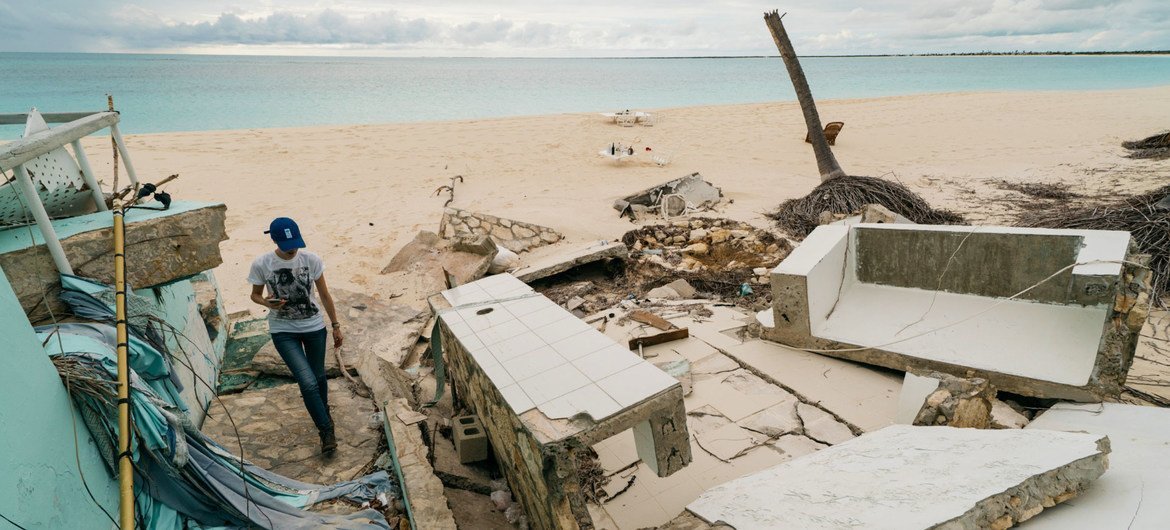Small island nations, mainly in the Caribbean and Pacific, are most at risk from catastrophic damage caused by greenhouse gases, new research by Victoria University economics professor Ilan Noy and others concludes.
Being a small island is a bigger risk factor than being in the poorest groups of nations, according to the working paper for non-profit think tank the Overseas Development Institute.
Noy said many small island nations were heavily coastal, exposed to tropical cyclones and relied economically on tourism, fishing and one or two crops.
Such countries could suffer losses equivalent to 100 percent of their annual GDP from a major climate change-fuelled event, he said.
“In terms of damages, when you compare low- and lower-middle-income … SIDS (small island developing states) to non-SIDs, they have about four times as much loss and damage than other low- and middle-income countries as a share of GDP.
“Of course, they are much smaller countries, so when you look at it in absolute terms it would be less than [losses in], say India.”
From 2000 to 2022, the researchers said more than 10,000 deaths were recorded from extreme weather events in small island developing states, and climate change caused by people was responsible for almost 4000 of those.
The study was timed to land before countries gather in Dubai to discuss climate action at the 28th annual global climate summit – or COP28 – on 30 November.
One big item on the to-do list is pinning down how wealthier countries, which have benefited from pumping out fossil fuels, will pay poorer countries to alleviate the damage they have caused.
Although countries agreed last year to establish a ‘loss and damage’ fund, they need to agree on details of how it will work. The World Bank will administer the money for the first four years.
The damage is expected to stretch into the hundreds of billions of dollars.
Efforts at climate summits so far have reined in expected future heating from up to 4.8 degrees Celsius around a decade ago, to between 2.1 and 2.8C.
But even the 1.2C already being experienced is wreaking havoc in some countries.
Noy thought the fund should use climate research linking specific events to greenhouse gases, to determine how much countries should be paid. That could help untangle how much damage would have happened anyway from damage created – or worsened – by a hotter planet. He argued there were other mechanisms for disaster relief to countries suffering non-fossil-fuel-related catastrophes.
While he acknowledged the research in the area was not perfect, he believed it was good enough to be used to hand out loss and damage funds. He also wanted to see more research funded in the area.
“The fact we need more science means we should get more science, not that we shouldn’t use the science we have.”
But Waikato University climate researcher Luke Harrington, a specialist in linking events to climate change, disagreed. He said requiring specific links to be proven would be unfair to some countries. Some places – particularly in poorer parts of the planet – did not have good historical climate records or good climate models, making it hard to work out what impact greenhouse gases were having.
He did not believe those science gaps would close any time soon, and he would rather the money was paid out using broad rules of thumb, based on what was known about climate change impacting droughts, floods and heatwaves.
When the science was in doubt because a country lacked data, the presumption should be in favour of paying, Dr Harrington said.
Meanwhile, he pointed out the first step was to get wealthy countries to pay into the fund in the first place.
UN Secretary-General António Guterres has called for the use of windfall taxes on fossil fuel companies to help pay.
There are also ongoing talks about who will be eligible. Some proposals would exclude the likes of Pakistan, which the United Nations Environment Programme estimates has seen US$30 billion (NZ$50.1b) in damages from severe flooding but emits less than 1 percent of global emissions.
The COP28 summit will run for two weeks.
SOURCE: RNZ PACIFIC/PACNEWS














